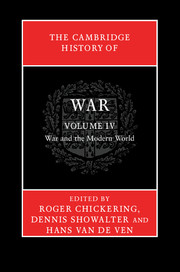Book contents
- Frontmatter
- Contents
- Illustrations
- Maps
- Notes on contributors
- Introduction to volume IV
- Part I The industrialization of warfare, 1850–1914
- Part II The Era of Total War, 1914–1945
- 8 World War I
- 9 Military captivity in two world wars
- 10 Military occupations, 1914–1945
- 11 Home fronts
- 12 The search for peace in the interwar period
- 13 Commemorating war, 1914–1945
- 14 Military doctrine and planning in the interwar era
- 15 The military and the revolutionary state
- 16 World War II
- Part III Post-total warfare, 1945–2005
- Select bibliography
- Index
- References
12 - The search for peace in the interwar period
from Part II - The Era of Total War, 1914–1945
Published online by Cambridge University Press: 05 December 2012
- Frontmatter
- Contents
- Illustrations
- Maps
- Notes on contributors
- Introduction to volume IV
- Part I The industrialization of warfare, 1850–1914
- Part II The Era of Total War, 1914–1945
- 8 World War I
- 9 Military captivity in two world wars
- 10 Military occupations, 1914–1945
- 11 Home fronts
- 12 The search for peace in the interwar period
- 13 Commemorating war, 1914–1945
- 14 Military doctrine and planning in the interwar era
- 15 The military and the revolutionary state
- 16 World War II
- Part III Post-total warfare, 1945–2005
- Select bibliography
- Index
- References
Summary
War has not only escaped direction and control, it involves all civilization and its elimination is a question of practical politics.
It wasn’t worth it.
World War I ended on an ominous note, with divided victors, unrepentant losers, and a shattered global economy. After unprecedented military and civilian casualties and huge physical destructiveness – followed by brutal armed conflicts in eastern Europe, the Near East, and Northern Asia – history’s first total war came to an official end almost a decade after the shots in Sarajevo. Throughout the war anguished combatants and neutrals had made proposals to prevent future explosions of violence, and they expected a more peaceful world to emerge. The length, ferocity, and inconclusive outcome of World War I guaranteed, however, that the quest for a permanent peace would be arduous.
Ultimately, it was also unsuccessful. There is now a scholarly consensus that its failure was due to the punitive peace treaties, the victors’ unwillingness or inability to enforce or revise these documents in the 1920s, and their craven surrender to aggressive states in the 1930s. Underlying this failure were the postwar national realities: Germany’s drive to regain world power, France’s futile efforts to maintain a costly victory, imperial Britain’s obsession with maintaining a power balance in Europe, the United States’ withdrawal from the obligations of treaty enforcement, the Soviet Union’s destabilizing influence, Fascist Italy’s adventurism, disunity in the new east-central and southern Europe, and the increasingly volatile non-western world. With a massive supply of diplomatic and political records, scholars have now examined the goals and methods of statesmen, private figures, and organizations that spoke in the name of peace but failed to forge a durable order.
- Type
- Chapter
- Information
- The Cambridge History of War , pp. 285 - 309Publisher: Cambridge University PressPrint publication year: 2012



